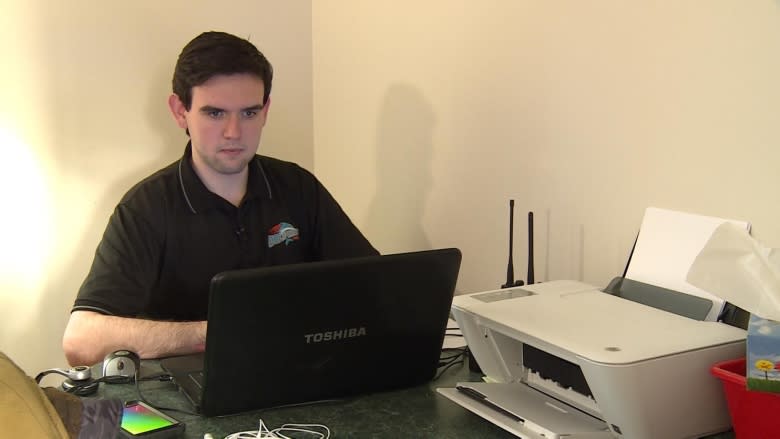N.W.T. Green Party candidate John Moore focuses on food security, mental health
John Moore digs his hands into the pockets of his army surplus parka.
He's trying to stay warm and at the same time look candidate-like for his outdoor interview that's also being recorded for television.
It's his first winter up North.
"My feet are just freezing," Moore murmurs between a question.
Moore, a St. Francis Xavier University student, arrived in Inuvik five months ago to make money while finishing his final elective course via distance learning. Not long after, the Green Party asked him to run as the Northwest Territories candidate.
"I got an email one morning as I was heading out the door basically saying that they were looking for someone in the territory to run, and reaching out. And I immediately cast it to the side and didn't give it a second thought," Moore says.
He reconsidered after a friend said he would vote Green if there were a candidate in the N.W.T. Eventually, he threw his name in the ring.
Odds aren't in his favour
In 2011, the Green Party garnered only three per cent of the vote in N.W.T.
That's not the only thing working against Moore. At 21, he wasn't even old enough to vote in the last federal election. He's also new to the North and its politics.
Moore admits he's not the frontrunner in this race.
"There's actually a very low chance that I will be carrying this district and I don't expect to," he says.
So why is Moore running?
"I want to bring up issues that other parties aren't touching on or even allowed to touch on."
His major issues are food security and mental health, but he talks about them as if they are one issue.
"I think that good mental health starts in the kitchen and good physical health starts in the mind," Moore says.
That's why Moore is pushing for greenhouses to play a larger role in feeding Northerners. He wants the federal government to fund technologies that help Northerners grow food in the winter on a larger market scale, which could provide affordable food and income for communities.
"The problem with greenhouses in the North, I would say, are two-fold," Moore says.
"Firstly, by and large they are not run like businesses. I think the best model for a greenhouse is as a co-op, and not even as a not-for-profit, as many of them are now. Having individual community members directly involved and directly with a say as to the direction of these things is very important."
Moore also says he's against whipped votes in the House of Commons, where MPs must vote according to the party line.
He takes that to heart because he's against his own party's position of phasing out nuclear energy.
"I think that on nuclear energy the party at large is wrong about it," Moore says.
"It's very clean energy, very safe energy. Where, say you come to Inuvik, you plop down a reactor and you have more energy than you know what to do with for a hundred years."
Getting the message out
Adding to his obstacles, Moore says he doesn't have access to the fundraising and campaign machinery that other parties have. But he says he does have one strength: his youth.
He's connecting with people on Facebook to try and get his message out.
He spends most of his days on computers at the public library or in his friend's dining room with a laptop, making posts and responding to comments.
"It's been one of the hallmarks of the campaign," Moore says.
"How can we engage all of those stakeholders in the N.W.T. and especially on the aboriginal side? If it's not in person, can we do something over the phone? Can we exchange a few emails? How can we make sure the voice is getting heard even outside more traditional means of communication?"
Moore says he is trying to be open and honest on social media, and hopes one of his greatest weaknesses might actually end up being a strength.
In the Northwest Territories, four candidates are running in the federal election Oct. 19. CBC will profile all four candidates.



